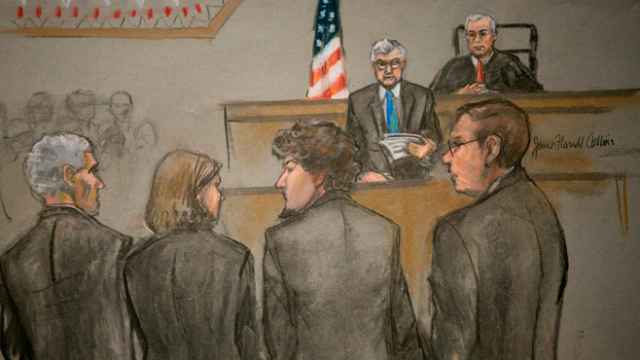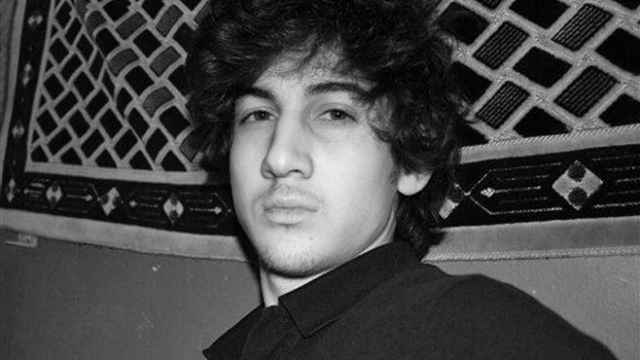BOSTON — Convicted Boston Marathon bomber Dzhokhar Tsarnaev is set to return to court on Tuesday for the next phase of his trial, when prosecutors will argue that he should be sentenced to death for his role in the deadly attack in 2013.
In sharp contrast to the guilt phase of the trial, when lawyers for the ethnic Chechen defendant did not contest that their client had killed three people and injured 264 in the bombing, the next four weeks are expected to feature emotional testimony from both sides as Tsarnaev fights for his life.
The question of whether Tsarnaev, 21, should live or die is highly controversial around Boston. Polls have shown that a plurality of area residents, 49 percent, prefer a life sentence, and family members of two of the people he killed have also spoken out against executing him.
Citing Al Qaeda materials found on Tsarnaev's computers, and a note suggesting the April 15, 2013 attack was an act of retribution for U.S. military campaigns in Muslim-dominated nations, prosecutors contend Tsarnaev wanted to "punish America" in an attack that showed a callous disregard for human life.
Defense attorneys have tried to paint Tsarnaev, who immigrated from Russia a decade before the attack, as adrift and under the influence of his older brother, 26-year-old Tamerlan, who died following a gunfight with police hours after the pair shot dead an officer.
"You're going to see more emotion in the testimony" in the trial's next phase, said David Weinstein, a lawyer in private practice in Florida who brought death penalty cases in prior work as a state and federal prosecutor.
"You can push the envelope a lot more in terms of what you're presenting during sentencing."
Who Will They Call?
Neither prosecutors nor defense lawyers have said publicly who they will call as witnesses during the trial's next phase.
Prosecutors are likely to call more people who personally knew the victims, including the three killed by the bombs, 8-year-old Martin Richard, Chinese exchange student Lingzi Lu, 23, and restaurant manager Krystle Campbell, 29, as well as the Massachusetts Institute of Technology police officer shot dead by the Tsarnaevs, Sean Collier, 26.
Richard's parents and Collier's sister have recently spoken out publicly against the effort to put Tsarnaev to death.
The defense is likely to call witnesses who are able to discuss the relationship between the two brothers, whose family moved to the United States when Dzohkhar Tsarnaev was 8 years old.
While Tsarnaev's parents returned to Russia before the attacks, his sisters, Bella and Alina, and Tamerlan's widow, Katherine Russell, live in the United States.
Tsarnaev's sisters visited him in prison, according to court filings, but no members of his family have attended his trial.
One hint of the sort of witnesses Tsarnaev's lawyers could call came in a court filing Thursday by federal prosecutors objecting to a defense suggestion that the judge ask the jurors to "look deep inside" themselves when considering whether they believe the testimony of foreign witnesses.
Family members could testify in person or by videotaped deposition, said Walter Prince, a Boston defense lawyer.
"Outside of the family members, friends, relatives, neighbors and other experts could talk about the domineering influence of the older brother," Prince said.
"Just about anything that can shed light on why this young man should not be executed is going to be offered."
Few Federal Executions
One thing that Tsarnaev has going for him is that very few people are executed on federal charges in the United States.
Just three out of 74 people sentenced to death since the reinstatement of the death penalty for federal crimes in 1988 have been executed, according to the Death Penalty Information Center. The three were Oklahoma City bomber Timothy McVeigh, drug trafficker Juan Raul Garza and Louis Jones Jr., a Gulf War veteran convicted of raping and murdering a female soldier in 1995.
Carried out between June 2001 and March 2003, those are the only federal executions the United States has seen in the past half a century.
While McVeigh was also found guilty of terror-related charges, others who were convicted of politically motivated violence have been sentenced to life in prison without the possibility of parole. They include Zacarias Moussaoui, one of the conspirators in the Sept. 11, 2001, attacks, and shoe-bomber Richard Reid.
Moussaoui and Reid are serving their sentences at the federal "Supermax" prison in Florence, Colorado, where Tsarnaev will likely be sent if sentenced to life rather than death.
That suggests that even if the jury sentences Tsarnaev to death, he may still serve a life term in prison while his lawyers appeal the sentence, said Boston College Law School professor Robert Bloom.
"The likelihood of him actually getting death is minimal," Bloom said.
A Message from The Moscow Times:
Dear readers,
We are facing unprecedented challenges. Russia's Prosecutor General's Office has designated The Moscow Times as an "undesirable" organization, criminalizing our work and putting our staff at risk of prosecution. This follows our earlier unjust labeling as a "foreign agent."
These actions are direct attempts to silence independent journalism in Russia. The authorities claim our work "discredits the decisions of the Russian leadership." We see things differently: we strive to provide accurate, unbiased reporting on Russia.
We, the journalists of The Moscow Times, refuse to be silenced. But to continue our work, we need your help.
Your support, no matter how small, makes a world of difference. If you can, please support us monthly starting from just $2. It's quick to set up, and every contribution makes a significant impact.
By supporting The Moscow Times, you're defending open, independent journalism in the face of repression. Thank you for standing with us.
Remind me later.





